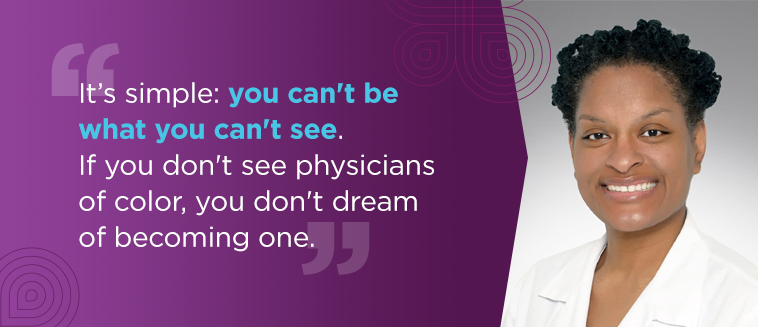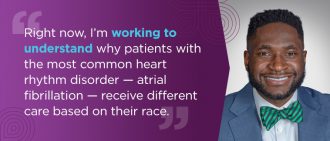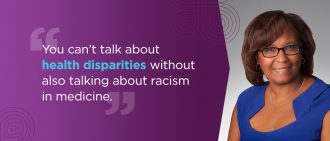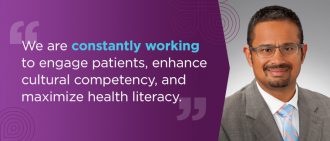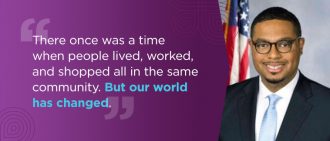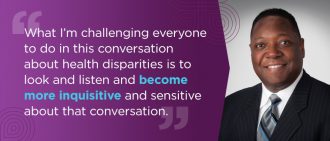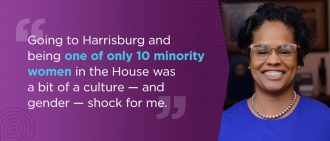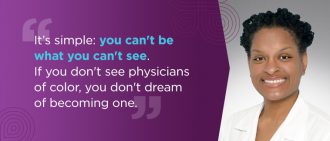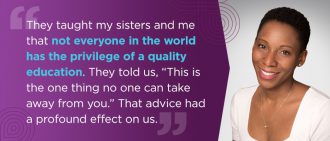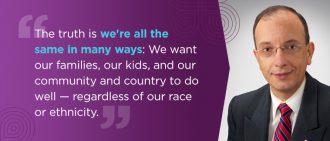Sharee Livingston, DO, is chair of obstetrics and gynecology at UPMC Lititz in Lancaster County, Pa., and a member of the hospital’s board of trustees. She also serves on the board of directors of Patients R Waiting (PRW), a physician-led nonprofit created to address health disparities by increasing diversity in medicine. In 2020, Dr. Livingston co-founded the group’s Diversifying Doulas Initiative, which recruits and trains doulas of color to respond to the growing maternal mortality crisis among Black and Latina women and provides free doula care to pregnant women of color.
A turning point in your life – at age 5 — was being at your great-grandmother’s side when she died. How did that affect you?
Before putting me on the bus to go to Catholic school every weekday, my great-grandmother and I would have oatmeal for breakfast together. It was our ritual. One morning, she suffered a stroke.
That experience — watching that loss of life, unable to help in any way — sparked a desire in my 5-year-old heart to help people, specifically women like her.
Today, as I look at the continuing impact of social determinants of health on my patients, I’m reminded that my great-grandmother’s death was the result of diabetes, which disproportionately affects people of color. There’s still so much we must do to improve our health outcomes — locally and nationally.
What led you to a career in medicine?
Health Disparities Q&A
One of my teachers, Sister Genevieve, recognized and encouraged my talents in math and science. She was my first mentor and helped me believe that a career in medicine was within my reach.
I was fortunate to receive an academic scholarship to St. Joseph’s University in Philadelphia, which is just a few blocks away from the Philadelphia College of Osteopathic Medicine (PCOM). As undergraduate biology students, my classmates and I would walk its halls, excited by the determination of the medical students we saw there. I fell in love with the energy I felt there. I knew I was meant to attend medical school there.
As a medical school student, I did a lot of positive transitioning that influenced my outlook and lifestyle. I became a vegan and began exercising. In doing so, I gradually began to understand that health and well-being go far beyond the physician-patient relationship.
Never Miss a Beat!
Subscribe to Our HealthBeat Newsletter!
Thank you for subscribing!
You can now select the specific newsletters you'd like to receive.
You are already subscribed.
Subscribe to more newsletters in our email preference center.
Sorry, an error occurred. Please try again later.
Get Healthy Tips Sent to Your Phone!
As I changed, family and friends who were watching me began changing their lifestyle habits, too. I realized I had the privilege of having knowledge to share and that became my goal in life: to impact the health and well-being of underserved communities.
Becoming an ob-gyn was a natural extension of that goal. The practice of obstetrics and gynecology allows me to engage women at every step in their lives. From their reproductive years to menopause, caring for women at each stage is rewarding.
Was it difficult being among only a few Black students in your medical school class?
Being a minority is rewarding and difficult at the same time. As a Black medical student, it’s hard not to buy into the imposter syndrome. You begin wondering should I be here? Do I really belong? Only 5% of all doctors are Black, yet we make up 12.3% of the population. That needle has not moved in 40 years and that is unacceptable.
Fortunately, I was blessed with a good foundation, surrounded by strong people in my family, and raised with strong Catholic values. Once I got into medical school, I took advantage of groups like the Student National Medical Association (SNMA), which supports underrepresented minority medical students. SNMA helped give us the confidence and sense of purpose we needed to thrive. It put us on a pathway to connect and engage with people in the Philadelphia community who needed our help.
When you connect with a community, your purpose comes into focus. You press forward because patients are “waiting” for you to assist them in achieving better health. To quote a comment I heard during a panel discussion of Black doctors, “We don’t have time for doubt — there’s too much work to be done!”
You’re very involved in a local physician-led group focused on increasing minority representation in health care. How is Patients R Waiting working to make a difference?
It’s simple: you can’t be what you can’t see. If you don’t see physicians of color, you don’t dream of becoming one. Patients R Waiting is a Lancaster-based nonprofit organization whose mission is to eliminate health disparities by increasing diversity in medicine.
We have three areas of focus. First, to increase the pipeline of minority clinicians. We want to plant the seed when students are young, so we host an annual summer STEM (science, technology, engineering, and math) camp for middle school students. We also have a Pipeline Dreams program designed for 11th and 12th grade high school students. The students participate in a 12-week program that exposes them to health care careers, health care providers, and scientific research.
Second, to help make our minority pipeline less leaky, we host an annual Diversity in Medicine (DIM) weekend conference to inspire and connect premedical students. UPMC has been an early supporter of the DIM conference.
And lastly, we want to support minority clinicians in practice. For physicians of color to improve health outcomes and the communities they serve, they too must feel supported and be healthy and happy. PRW promotes activities like our “What the Health” Book Club to connect health care professionals of color and offer a safe place to candidly discuss issues like health disparities and racial inequality.
To close the growing infant mortality gap among Black and Latina women, you co-founded Patients R Waiting’s Diversifying Doulas Initiative at the height of the COVID pandemic. How can doulas help address this problem?
Black women are three to four times more likely to die in childbirth than their White counterparts. It’s not just an issue of race — that statistic applies to all Black women, regardless of their socioeconomic status. Armed with this knowledge, we launched the Diversifying Doulas Initiative in June 2020 in anticipation of worsening health disparities due to the COVID pandemic.
Doulas are nonmedical birth assistants. There’s compelling research demonstrating the value of doulas, particularly among vulnerable and marginalized pregnant women of color. Through their education and outreach support, doulas help to decrease the need for cesarean sections, increase participation in breastfeeding, decrease postpartum depression, and decrease the number of low birthweight infants.
On average, cesarean sections cost $10,000 more than vaginal births. With the average cost of a doula being $1,000, providing doula services can be cost neutral by lowering the number of cesarean sections performed.
How does the program work?
It can cost $1,000 or more for a woman to enlist the services of a doula. That cost is prohibitive for women who need them most. The mission of the Diversifying Doulas Initiative is to provide pregnant women of color with doula care, free of charge.
Doulas provide nonmedical birth support, both virtually and in person. They do not provide direct medical care. They’re a trusted resource to support a woman’s emotional and physical well-being.
To help people understand the role of doulas, I use an acronym to describe them. They’re “A PIE in the sky” — they advocate for the mother and baby, and they offer vital physical, informational, and emotional support. Particularly, postpartum depression and anxiety are decreased among women supported by doulas.
But there just aren’t enough of them to meet the need. To address this, we offer women of color formal training to become certified doulas. The response has been phenomenal. I’m proud to say that our first grant for the program came from UPMC Pinnacle Foundation in my hometown of Harrisburg, Pa. Other support has come from the Lancaster Osteopathic Health Foundation, Gateway Health, and Lancaster Cares COVID-19 Response Fund, which was funded by the Lancaster County Community Foundation and the United Way.
We want to ensure there is no doubt about the quality of our doulas. By design, our program is rigorous and exceeds the standards of most doula certification processes. We do 16 weeks of online training, then participate in three co-managed births, and hands-on training. Through a process curated by doulas themselves, we increased their numbers in Lancaster by 1900% — yes, that number’s correct! — in just one year. By the end of our second year, we hope to provide free doula services to 250 pregnant women of color.
What’s been the response of the medical community to the initiative?
We are seeing greater acceptance of doulas because it’s clear that it takes more than doctors and nurses to provide comprehensive care to pregnant women of color. A whole team of providers is needed — inside and outside of pregnancy — from doctors and nurses to midwives, mental health specialists, and doulas. That team approach is especially crucial during the postpartum period, when nearly 54% of maternal morbidity and mortality issues occur.
Although we didn’t know it when we created our program, UPMC Magee-Womens Hospital in Pittsburgh has been a leader in using doulas as part of its obstetric care for women of color. We’re hoping to learn more from their experiences and its Birth Circle Doulas as we continue our efforts.
There’s so much that we in health care can do to help reduce maternal morbidity in Black and Brown women in Pennsylvania. Currently, doulas are not licensed here in the Commonwealth. As a result, they’re not reimbursed under the Medicaid state plan. There’s proposed legislation addressing this in both the state House and Senate that needs our support.
This effort is very personal for me. I have tragically seen Black mothers die during childbirth. As a Black woman, I worry for the maternal health and safety of my own family and friends. I’m fully committed to reversing this serious trend seen in Black and Brown pregnancies.
The fruits of the Diversifying Doulas Initiative are already visible. I recently watched as a struggling, worried new Black mother was discharged home after her delivery. She rode home with her doula who did not want to leave her side! It was such a great feeling to know that our care would long continue for that new mother after she left the hospital.
For more information on health disparities, visit UPMC.com/healthdisparities.
About Government Advocacy
UPMC is a world-renowned health care provider and insurer headquartered in Pittsburgh, Pennsylvania. Learn about UPMC’s position on public health issues and gain a better understanding of the initiatives that advance the health care industry.
